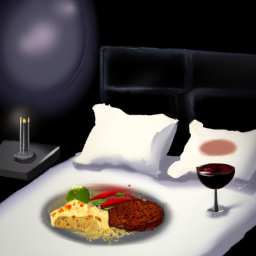As a person who frequently experiences vibrant dreams, I’ve always been intrigued by the connection between what we eat and the dreams we have. Have you ever observed how some foods seem to lead to more vivid dreams, while others seem to contribute to a more tranquil sleep?
It turns out that what we eat can indeed have an impact on the content and quality of our dreams. From spicy foods to high-fat meals, there are certain types of foods that have been linked to more intense and memorable dreams.
In this article, we will explore the top foods that are thought to cause dreams and the science behind why they have this effect on our brains. So, the next time you’re looking for a late-night snack, consider the potential impact it might have on your dreams before making your choice.
Key Takeaways
- Foods high in tryptophan like turkey and cheese can lead to more vivid and emotional dreams.
- Chocolate, especially dark chocolate, can enhance dreaming and promote overall brain health.
- Spicy and high-fat foods can disrupt normal sleep patterns and lead to more intense dreams.
- Foods high in vitamin B6, such as chickpeas, tuna, bananas, and pistachios, can increase the chances of having more meaningful dreams and better sleep quality.
The Relationship Between Food and Dreams
You’ll be surprised to learn how much of an impact the food you eat has on your dreams. Certain foods have been found to cause vivid or strange dreams, while others can even influence the content of your dreams.
For example, foods that are high in tryptophan, like turkey, can increase the production of serotonin in the brain, which can lead to more vivid and emotional dreams. But it’s not just the chemical composition of food that can affect your dreams.
The act of eating itself can also play a role. Eating a big meal before bed can cause your body to work overtime to digest the food, which can result in more restless and vivid dreams.
Now, let’s talk about how spicy foods can impact your dreams.
Spicy Foods
Spicy dishes can increase the likelihood of having vivid and intense dreams, according to a study conducted by the University of Maryland Medical Center. This is because spicy foods contain capsaicin, a compound that can cause a physical reaction in the body, including increased heart rate and body temperature. These reactions can disrupt normal sleep patterns and lead to more active dreaming.
Here are some key points to keep in mind about the relationship between spicy foods and dreams:
- Spicy foods can cause physical reactions in the body that disrupt normal sleep patterns.
- These disruptions can lead to more active dreaming and vivid dreams.
- Not everyone will experience this effect from spicy foods, as individual differences in tolerance to capsaicin can vary.
- It’s important to pay attention to how your body reacts to spicy foods, especially if you’re prone to sleep disturbances or vivid dreams.
Moving on to the next topic, cheese also has an interesting relationship with dreams.
Cheese
If you’re a cheese lover, you may be interested to know that it’s been linked to some interesting dream experiences. Cheese contains an amino acid called tryptophan, which has a calming effect and can help you fall asleep faster. However, it can also cause vivid dreams and even nightmares in some people.
One study found that people who ate cheese before bed had more vivid dreams compared to those who didn’t. The type of cheese also seemed to play a role, with blue cheese and cheddar causing the most intense dreams. So, if you want to spice up your dream life, try adding a little cheese to your nighttime snack.
Speaking of which, let’s move on to another food that can affect our dreams – chocolate.
Chocolate
Get ready to indulge in delicious dreams with chocolate, a treat that can transport you to a whole new world. Not only is it a sweet and satisfying snack, but it can also cause some interesting and vivid dreams.
Here are a few reasons why:
- Chocolate contains caffeine, which can stimulate brain activity and enhance dreaming.
- It also has theobromine, which can have a relaxing effect on the body and mind.
- Some people believe that the sweetness of chocolate can trigger happy and positive dreams.
- Dark chocolate, in particular, contains high levels of antioxidants that can promote overall brain health.
But be careful not to overindulge, as eating too much chocolate before bed can also cause nightmares.
Moving on to the next topic, alcohol can also have a significant impact on dream activity.
Alcohol
So, let’s talk about alcohol. I’ve noticed that when I drink, my dreams seem to be more vivid and intense.
This is because alcohol can disrupt REM sleep, the stage of sleep where most dreaming occurs.
Additionally, alcohol can lead to dehydration, which can negatively impact sleep quality.
REM Sleep and Alcohol
Although alcohol may help me fall asleep, it can actually disrupt my REM sleep and lead to vivid dreams. This is because alcohol affects the brain’s ability to regulate sleep cycles and can cause me to spend less time in REM sleep, which is the stage of sleep associated with dreaming.
As a result, I may experience more intense dreams that can be disturbing or even nightmare-like. To better understand how alcohol affects my REM sleep, I’ve looked into some of the ways that alcohol can disrupt my sleep patterns.
Here are some of the things I’ve found:
- Alcohol can increase the amount of time it takes for me to fall asleep.
- Alcohol can cause me to wake up more frequently during the night.
- Alcohol can lead to shallow, restless sleep that doesn’t leave me feeling rested in the morning.
- Alcohol can cause me to experience more vivid dreams that can feel unsettling or even scary.
Knowing all of this, it’s clear that drinking alcohol before bed is not a good idea if I want to get a good night’s sleep. Instead, I need to focus on staying hydrated and making sure I’m taking care of my body so that I can sleep soundly and wake up feeling refreshed.
Dehydration and Sleep Quality
Staying hydrated is crucial for improving your sleep quality and feeling refreshed in the morning. Dehydration can interfere with your body’s ability to regulate its temperature, leading to tossing and turning throughout the night. Additionally, dehydration can cause headaches, which can make it difficult to fall and stay asleep.
It’s recommended that adults drink at least 8 cups of water per day, but this can vary depending on factors such as exercise, climate, and overall health. To ensure that you’re staying properly hydrated, try incorporating foods with high water content into your diet, such as cucumber, watermelon, and celery. By prioritizing hydration, you can improve your sleep quality and wake up feeling more rested and energized.
| Food | Water Content | Serving Size |
|---|---|---|
| Cucumber | 96% | 1 cup |
| Watermelon | 92% | 1 cup |
| Celery | 95% | 1 cup |
Moving onto the next topic, it’s important to note that sugar intake can also affect our sleep quality.
Sugar
You’ll find that eating sugary foods before bed can often result in more vivid and intense dreams. This is because sugar can cause a spike in blood sugar levels, which can lead to increased brain activity during sleep. As a result, your dreams may become more active and imaginative, which can be both positive and negative.
If you want to experiment with this, try eating a small amount of sugary food before bed and see if you notice a difference in your dreams. However, it’s important to note that consuming too much sugar can have negative effects on your health and sleep quality overall. So, be sure to indulge in moderation and balance out your diet with healthy foods as well.
As we move onto the next topic about high-fat foods, it’s worth noting that these can also have an impact on your dreams.
High-Fat Foods
If you’ve ever had a greasy burger or a plate of fries before bed, you may have noticed how your sleep feels more restless and disrupted. Well, it’s not just your imagination. High-fat foods, such as fast food, can cause disruptions in your sleep and even lead to vivid dreams.
This is because these foods can cause indigestion and heartburn, which can make it harder to fall asleep and stay asleep throughout the night. Additionally, high-fat foods can lead to changes in your brain chemistry, which can cause you to have more vivid and intense dreams. These dreams may even be scary or unsettling, leading to a poor quality of sleep overall.
So if you want to have a peaceful night’s sleep, it’s best to avoid high-fat foods before bed and opt for healthier options instead. Speaking of which, did you know that some foods containing vitamin b6 can actually promote better sleep and even lead to more vivid dreams?
Foods Containing Vitamin B6
Get ready to savor some delicious options because reaching for snacks high in vitamin B6 can lead to a more restful and vivid night’s sleep. This nutrient is essential in the production of serotonin and melatonin, two hormones that regulate sleep patterns and mood. Eating foods rich in vitamin B6 can increase your chances of having more meaningful dreams and better sleep quality.
Here are some foods that are high in vitamin B6:
- Chickpeas
- Tuna
- Bananas
- Pistachios
But keep in mind that while these foods can contribute to a better night’s sleep, they’re not the only factor that can affect your dreams. Other factors such as stress, medication, and sleep disorders can also play a role in your dream experience.
Other Factors That May Affect Your Dreams
Like a spider spinning a web, there are many factors that can weave together to affect the tapestry of your dreams. While foods containing vitamin B6 may increase dream vividness and recall, there are other factors that can also play a role. For instance, stress and anxiety can cause more frequent nightmares, while relaxation and a sense of safety can lead to more pleasant dreams. Additionally, medications, alcohol, and substance use can impact the content and intensity of your dreams.
Another factor that can affect your dreams is your sleep environment. Sleeping in a noisy or uncomfortable space can disrupt your sleep and lead to more fragmented dreams. On the other hand, a quiet, peaceful environment can promote more restful sleep and positive dream experiences. By paying attention to these various factors and making adjustments as needed, you can create an environment that promotes a healthy and enjoyable dream life.
| Factors That Can Affect Your Dreams | Impact on Dream Experience | |||
|---|---|---|---|---|
| Stress and Anxiety | More frequent nightmares | |||
| Relaxation and Sense of Safety | More pleasant dreams | |||
| Medications, Alcohol, and Substance Use | Changes in content and intensity of dreams | |||
| Sleep Environment | More restful sleep and positive dream experiences | Mental and Emotional State | Directly affects the content and quality of dreams |
Frequently Asked Questions
How do dreams affect our overall health?
Dreams are important for our overall health as they help consolidate memories, regulate emotions, and promote problem-solving. They can also provide insight into our subconscious and help us work through unresolved issues.
Can certain foods affect the type or theme of dreams we have?
Certain foods can affect the type and theme of my dreams. For example, spicy or heavy meals can lead to vivid, intense dreams, while foods high in tryptophan, like turkey, can promote more peaceful and calming dreams.
Are there any foods that can help prevent nightmares?
Oh boy, do I have good news for you! Eating a banana before bed will prevent any nightmares from haunting you. Trust me, it’s the ultimate superfood for a peaceful night’s sleep.
How can we improve the quality of our dreams?
To improve the quality of my dreams, I establish a relaxing bedtime routine, avoid caffeine and alcohol, and practice mindfulness meditation. I also keep a dream journal to increase self-awareness and explore the meaning behind my dreams.
Is it possible for food to influence lucid dreaming?
Lucid dreaming can be influenced by what I eat. Like a puzzle, certain foods fit together to enhance my ability to control my dreams. Pay attention to foods rich in tryptophan, vitamin B6, and magnesium for optimal results.
Conclusion
So, what have we learned? It turns out that the foods we eat can have a significant impact on the quality and content of our dreams.
Spicy foods, cheese, chocolate, alcohol, sugar, high-fat foods, and those containing vitamin B6 are all potential dream triggers. However, it’s important to note that everyone is different, and what causes vivid dreams for one person may not affect another.
I personally experienced this phenomenon after consuming a large amount of pizza before bed. I had vivid, surreal dreams that night, unlike anything I had experienced before. It was fascinating to see firsthand how food can affect our subconscious mind.
Overall, it’s important to pay attention to what we eat and how it affects us, even in our dreams. Sweet dreams!









